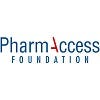Blockchain of Trust: Digitizing a Mother’s Journey Through Pregnancy
The story of baby Abdalah, one of the first children born worldwide who’s journey was tracked entirely using blockchain technology.
When baby Abdalah was born at Tingi Health Center in the district of Kilwa on the southern coast of Tanzania in June 2018 he became an unwitting trailblazer, forever tied to a small but notable moment. He had just become one of the first children born worldwide who’s journey was tracked entirely using Blockchain technology. This small yet significant step showed that using technology to map maternal neo-natal care in rural, low-resource, settings is possible.
Only 6 months earlier, Tingi Health Centre was like any other in the region — under-resourced and relying on paper-based records. This makes the speed of the project’s development into a working prototype all the more remarkable. Since then 46 healthy babies have been delivered at the small rural clinic and Abdalah’s mother, Salma, is just one of 196 mothers from the community enrolled in the “The Chain of Trust” — the groundbreaking proof of concept project aimed at providing proof for the effectiveness of Blockchain technology to collect, label and verify digital health data. The project itself is one of the first of its kind globally. Technical support is provided by AID:Tech, a tech company leveraging Blockchain technology to bring social and financial inclusion to the world’s underserved populations by offering innovative solutions to an international audience.
Miriam and Adolphina are the midwives responsible for implementing the system on the ground. They are motivated and eager to embrace the new technology. It makes their professional lives much easier. Many Tanzanian healthcare professionals give care in rural settings but Blockchain data management provides an evidence-based platform for the care they give. What’s more, the data is transparent, traceable, collected in real-time, and actionable. In a country where child and maternal mortality rates are high, where there is generally low healthcare funding, no accurate patient numbers per facility, and a general lack of reliable data all-round, it is a giant leap forward and potentially a systematic game-changer if rolled out across an entire region, or even, nationally.
The interface, accessed via smartphone or tablet, is where all the different pieces come together — information, technology, measurement and feedback — to provide a crucial evidence-based approach. That data maps the journey of pregnant women, placing them at the center of their own real-time healthcare needs. Patient adherence to antenatal care guidelines, delivery and postnatal care can all be monitored, ultimately ensuring they receive their medical entitlements in an efficient and transparent way.
It also leads to huge potential cost savings as each part in the chain can do their work more efficiently. For example, the old paper way of working meant midwives having to fill out four different types of forms to track treatments and supplies. This required the midwives to take an additional day, outside regular working time, to collate. Now all data is synchronized. The process eliminates time consuming paper recording and duplicates, ensuring midwives like Miriam & Adolphina, don’t have to work overtime and can give more time to their primary function as medical professionals.
There are benefits for the care facility too. In this case, Tingi Health Centre is given the tools to gather data quickly on the information of each patient’s journey and manage appointments. Donors and stakeholders also get direct feedback on the use of their funds. This information provides a proper basis for Pay-for-Performance or Results-based Financing, meaning healthcare facilities are paid for services actually delivered, and are incentivized to ensure that patient needs are satisfied.
Fundamentally, utilizing a technology such as Blockchain in healthcare is about providing the right incentives, not the wrong ones. Measurable care and insight into a mother’s pregnancy journey in countries with high maternal mortality rates can illustrate more clearly the mother’s path and the complications they may encounter. It allows us to enhance both the journey to delivery and the health professional’s insight and management of care. A goal worth striving for and very much part of our overall mission of transforming healthcare access and quality.
